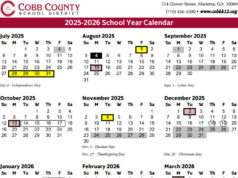
It’s that time of year again—the college application process has begun for high school seniors, and many students will spend the next few months taking exams, filling out application forms and sending off letters of recommendation in hopes of receiving bulky acceptance letters from their favorite schools.
This process isn’t an easy one, choosing the best schools to apply to, studying for the SAT, crafting the perfect essay and finding scholarships to help pay for everything, all while keeping up with schoolwork and extracurricular activities. It is a daunting task for even the most organized student, and staff and a recent high school graduate from some of Cobb’s colleges and schools are weighing in on the challenges students face when applying to college and what resources they should be taking advantage of.
Start Early
With college applications becoming more competitive each year, many students are thinking about the process long before their senior year rolls around, and there are things younger students can do to help prepare them for the months of essays and applications they’ll soon face. Neil Clark, dean of college counseling and guidance at The Walker School in Marietta, encourages students to follow their passions when they first enter high school. “Kids should do whatever makes them excited, and stick with it,” he says. “Having four years of involvement shows commitment and maturity to colleges, and it also provides opportunities for leadership positions.”
Focusing on academics is also an important decision to make as soon as students enter high school. “In general, the more demanding set of classes that a student takes and is successful in, the more competitive the student will be in the college admission process and the more options the student will have for college,” adds Bob Montague, high school principal at Mt. Bethel Christian Academy in east Cobb. “However, students and their parents need to be cautious against taking such a demanding academic load that students cannot manage the associated stress or make the time for other activities or relationships outside of the classroom that are important in their lives.”
Adrienne Gilbert, a college counselor at Whitefield Academy in Mableton, stresses the importance of college visits during the first few years of high school. “Get as much time as you can in front of a college admissions counselor to ask questions, introduce yourself and to listen to what they have to say about their universities,” she says. “Colleges track your demonstrated interest, and taking time out of your busy schedule to meet with them certainly counts towards this.”
Preparing for the SAT and ACT
Students planning to attend a traditional four-year university will be required to take the SAT or ACT as part of their application process. These exams give students an opportunity to show what they’ve learned in school and how well they can apply that knowledge. “The advantage of these tests is to give students an opportunity to assess their education through the lens of a national test,” says Megan Strange, upper school principal at North Cobb Christian School in Kennesaw. “These tests put public schools, private schools, online schools, home schools and others on a level playing field as they provide a third party assessment of a student’s cognitive abilities.”
Strange went on to say that there are varying schools of thought as to which test is better for a student to take and that there are pros and cons to both tests and varying strategies to consider. “At North Cobb Christian School, we require our students to take either the ACT or SAT at least once prior to January of their senior year,” she continues. “We encourage our students to take both tests at least once as students typically do better on one or the other and can really focus their efforts on that one test as far as test prep.”
Students typically take these tests during the spring of their junior year, which allows them plenty of time to retake the exams if they aren’t happy with their original scores. Many schools in Cobb also offer classes to help prepare students for both the SAT and ACT, and parents can easily find many prep courses throughout Cobb and metro Atlanta.
Applying for Scholarships
Applying for a scholarship is an important part of the college application process, especially if students are considering going out of state. It can be a great way to offset not only tuition costs, but also everyday expenses during college, such as gas, groceries and school supplies. There is an abundance of scholarship money for students to receive from colleges, so knowing the best way to go about applying can be difficult.
“The [application] process differs greatly from school to school and from scholarship to scholarship, so the best thing to do is contact the school for assistance,” suggests Ron Day, director of financial aid at Kennesaw State University. “At a minimum, you could expect an application or essay to pursue the scholarship of your interest, but some are automatically awarded by institutions solely based on your academic and extracurricular achievements,” adds Sam Mahra, KSU’s director of student recruitment.
Clark feels like the best way for students to start the scholarship application process is by making a list of schools they plan on applying to. “The best source for money is straight from the schools, because outside sources typically require more work for less money,” he explains. “With outside scholarships, you have to be careful of scams, and it takes a lot of dedication to keep track of the varying requirements and deadlines.”
For students who aren’t quite sure where to start, Day suggests going online to get organized. “Go to studentaid.gov for a useful checklist,” he says. “Also, gacollege411.org can be helpful, and high school counselors are a great resource as well.” If students are interested in researching outside scholarships, Clark recommends fastweb.com as a good place to start.
Technical Programs and Schools
Not all students are interested in attending a four-year college or university, so they choose to pursue their career via technical programs and schools. “Tech-prep” programs in many high schools prepare students for a more vocation-oriented program of study and often teach children skills that are specifically related to their desired career path. The process of applying to technical schools is largely the same as applying to a four-year university, but there are a few different things for students to consider.
“If you want to continue your education at a technical school, it’s first important to decide which school is the best for you,” advises Sarah Dikerson, a recent graduate of Marietta High School and freshman in the College of Culinary Arts at Johnson and Wales University. “The programs are different at each school, and it’s important to ask the admissions staff about them and find the ones that focus on the aspects of the industry you’re most interested in.”
Rebecca Long with Chattahoochee Technical College suggests students consider taking dual enrollment courses while still in high school. “Explore programs such as College Credit Now to see if you can qualify for dual enrollment programs to earn college credit before even finishing high school,” she says. “Some of our recent College Credit Now students earned more than 40 hours of college credit during their junior and senior years of high school.”
For many technical schools, the application may focus heavily on a student’s involvement and experience within the desired field. “The main thing with my applications was they wanted detailed descriptions of my culinary experiences, including what happens in our classes, what I’ve done with caterings at school and what went in to the competitions I’ve done,” says Dikerson. For this reason, involvement in a student’s desired field early on is a necessity for students planning to attend technical school.
Challenges Students Face
With more than 4,000 colleges and universities in the United States, narrowing down the list of colleges a student wants to apply to can seem like an impossible task. “Students need to expand their exposure to additional college options that may be a fit for them. Too often, students never get beyond an awareness of colleges that family members have attended or athletic teams they’ve watched,” Montague explains. “The second challenge is paring down the options to a manageable list of colleges that fit their talents and interests.”
Staying motivated and organized is another problem many students face when applying for colleges. All schools have different deadlines and requirements, and keeping track of all application components can be tricky. “During senior year, students are often busy doing other things, but if students can get organized early on it will really help,” Clark adds. Making a filing system, creating a spreadsheet and even setting up alerts and calendar entries on a cell phone can help seniors stay focused and ensure that they don’t miss any important application deadlines. Clark also believes one of the most important things families can do during the application process is to simply talk to each other. “Mom and dad may have to push their kids, but make it into a family event and talk about different schools each night,” he suggests. “Kids may roll their eyes, but it’s a chance for them to discuss their priorities. Chat as a family, and remember it’ll all work out.”

















